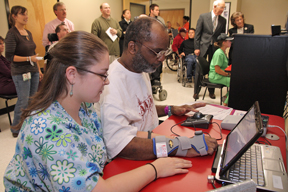Many patients with spinal cord injuries didn’t have a bright future in 1969 when Samuel Stover, M.D., joined UAB. Stover says that because of continued improvements in medicine, the outlook wasn’t as gloomy when he retired from his post as chair of the Department of Physical Medicine & Rehabilitation in 1994.
 |
| Diana Marin, an occupational therapist in the Spain Rehabilitation Center, helps patient London Jones navigate the laptop computer in the new Assisted Technology Lab in Spain Rehab. |
“Now, not only can patients live a much longer life, but they can participate in that life so much more,” Stover says. “Much of that has to do with better medical care, but much of that also is due to the technology available to help them. This facility is a prime example of that. It will help people with neurological problems of many kinds.”
The lab, located on the third floor of the Center for Psychiatric Medicine, features state-of-the-art equipment that can enhance the quality of life of people with spinal cord injury. Patients have the ability to get hands-on use of the assistive technology and devices in the lab to help them learn to live and function with greater independence 24 hours a day, seven days a week.
“We’ve wanted to do this project for a long time,” says Amie Jackson, M.D., chair of Physical Medicine & Rehabilitation. “It’s one of the first times we’ve been able to take advantage of the explosion of technology that has been developed for individuals with spinal cord injury or disability, and we think this is going to be a boon for our patients.”
Empowering patients
The lab was made possible in part due to a grant from the Christopher and Dana Reeve Foundation, the Spinal Cord Injury Nursing Team and the department of Physical Medicine & Rehabilitation. The Spinal Cord Injury Team, consisting of members from nursing, physical and occupational therapists, psychologists, recreational therapists and social workers, applied for the Reeve Foundation grant and solicited other help from their departments to develop the patient-run facility.
Patients will work with therapists and on their own on equipment ranging from a computer workstation to a school station featuring a laptop and tablet personal computer to an entertainment station featuring a Nintendo Wii. “When patients with spinal cord injuries come in they really have no idea what life has in store for them and what they can do after injury,” says Phil Klebine, assistant director of research services at Spain Rehab.
“They often assume they can’t do their work or go to school or have a family. When they come here, we try to dispel those misconceptions. One way is by showing them technology can help them in the home, in entertainment, in work and in school. Now they can come in and see how they can leave here and be more independent than they probably imagined they could.”
That psychological boost, Jackson says, aids in their recovery.
“For many of these patients their body may be disabled, but their brain is not,” Jackson says. “This shows them that a big part of them still is the same and still is very active. It shows you do these things disabled or not, and that’s a significant psychological benefit.”
Naming the facility
Stover is a nationally respected doctor who helped establish a nationwide spinal cord-injury model system that is federally funded by the National Institute on Disability and Rehabilitation Research. His contributions to UAB and the Department of Physical Medicine & Rehabilitation are numerous says Jackson, a former student of Stover’s.
It was only natural, she says, that the facility be named for Stover.
“We wanted to come up with a way of attaching a name to this that had a proven body of work,” Jackson says. “Many of the goals we’ve had for Spain through the years were really instigated by Dr. Stover. He put a lot of honor and integrity into our specialty, as well as into helping us understand our major concern is our patients.”
Stover says he is humbled by the honor. The greater satisfaction, he says, is that the Department of Physical Medicine & Rehabilitation continues to reach for innovative ways to help their patients.
“It’s an honor for people to remember me 14 years after I retired and feel I was worthy of having anything named after me, let alone a very nice technology laboratory,” Stover says. “It’s a facility that can help to do things that I always wished I could do but didn’t have the technology to do.
“But I’m just so happy that the program has continued on and continued to get better. I think it would be disappointment for a chairman of the department to leave and have things not be at least maintained. I’m pleased with Spain and Dr. Jackson for making it much, much better.”